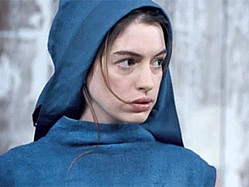The world's longest-running musical is about to hit theaters with a massive A-list cast in tow. Hugh Jackman, Anne Hathaway and Russell Crowe have all assembled for the cinematic adaptation of "Les Misérables." What could go wrong?
With a Christmas Day opening, a bit of Oscar buzz and supporting turns from the likes of Sacha Baron Cohen and Helena Bonham Carter, "Les Mis" seems like a safe bet for success. But what are critics saying? The positive vibes aren't unanimous, but 72 percent of the reviews gathered by Rotten Tomatoes at the time of this writing were favorable.
Director Tom Hooper made "The King's Speech," so he certainly knows a thing or two about awards. "Les Mis" is set in 19th-century France and has all sorts of tear-jerking and triumphant moments. Before he was Wolverine, Hugh Jackman was singing and dancing in "Oklahoma!," which earned him an Olivier Award for Best Actor in a Musical. The Tony Award winner, who later showed off his moves hosting the Oscars, stars in "Les Mis" as ex-prisoner Jean Valjean, hunted and on the run.
Film critic Richard Roeper called it "an unforgettable moviegoing experience, sure to garner multiple Oscar nominations," but the Toronto Star's Peter Howell specifically called out its awards-ready design, writing that the musical "sings so desperately for its Oscar supper, it makes you want to scoop it up in your arms like Jean Valjean cradling the wretched Fantine." Roeper's former onscreen partner from the syndicated "At the Movies," the Chicago Tribune's Michael Phillips, didn't like it either.
But 72 percent is still a majority! So without further ado (or "adieu," which is French but not grammatically correct), here's a roundup of some of the specific things the critics are saying about "Les Misérables."
The Singing
"[Hooper] does something clever in asking his actors to sing live on camera, rather than having them record their vocals in a booth somewhere as is the norm, and for shooting the big numbers in single takes. The intimacy can be uncomfortable at times and that closeness highlights self-indulgent tendencies, but the meaning behind lyrics which have become so well-known shines through anew. You'd probably heard 'I Dreamed a Dream,' the plaintive ballad of the doomed prostitute Fantine, sung countless times even before Susan Boyle unfortunately popularized it again in 2009. An emaciated and shorn Anne Hathaway finds fresh pain and regret in those words because her rendition is choked with sobs, because it's not perfect.
That's definitely part of the fascination of this version of 'Les Misérables': seeing how these A-list stars handle the demands of near-constant singing. Jackman seems totally in command (although the higher part of his register gets a bit nasal and strained). Amanda Seyfried, as Fantine's daughter, Cosette, whom Jean Valjean adopts, had already proven she can sing in 'Mamma Mia!' but hits some freakishly high notes here — which isn't always a good thing. Eddie Redmayne is a lovely surprise as the love-struck revolutionary Marius. And of course, Samantha Barks gives an effortless performance as the lonely and doomed Éponine — everyone here is doomed, it's 'Les Misérables' — a role she'd performed on the London stage." — Christy Lemire, The Associated Press
The Acting
"At 157 minutes, the film is overlong, but how else to pack in so many songs and stories? Fortunately, this sprawling epic is well-anchored. There cannot be a better big-screen showman than Jackman. Valjean must be so many different men over the years, and the actor does an outstanding job in transforming himself repeatedly. Crowe, alas, is less successful. He is so outmatched by the musical requirements of his role, and imbues Javert with so little passion, one wonders why he was hired.
As for Hathaway, she devours the screen in her brief appearance, as if the picture were hers for the taking. Many will be impressed by this forceful approach, though others may detect a brash — and likely successful — Oscar grab. (If that assessment seems unfair, watch the film and ask yourself this: Do you genuinely see a weak and pitiful outcast, or do you see Anne Hathaway?) The rest of the cast meshes together well, from the children (including Daniel Huttlestone as Gavroche) to stage vets like Samantha Barks (who plays the lovesick Éponine)." — Elizabeth Weitzman, New York Daily News
The Grittiness
"[O]ne of the most visceral aspects of this gorgeously shot epic is its embrace of grittiness. Panoramic shots of the poor, faces encrusted with sores and grime, begging for pennies from the rich, drive home the desperation of 19th-century France. This unflinching depiction of the brutal nature of squalor gives the film its bite. But there is also a price to be paid for all that realism. Sometimes the sprawling melodrama is so dire and grim that it's hard to find comfort in the rousing score and comic interludes. ... That said, it's hard to resist the movie's wrenching sense of intimacy." — Karen D'Souza, San Jose Mercury News
The Final Word
"The tasteless bombardment that is 'Les Misérables' would, under most circumstances, send audiences screaming from the theater, but the film is going to be a monster hit and award winner, and not entirely unjustly. After 30 or so of its 157 minutes, you build up a tolerance for those it's-alive-alive-alive! close-ups and begin to admire the gumption — along with the novelty of being worked over by such a big, shameless Broadway musical without having to pay Broadway prices. The authors (there are four credited screenwriters) have pared down Victor Hugo's great wallow of a novel to its dumb, pious moral (Christian forgiveness always wins, though you might not live to break out the champagne), but the show has been audience-tested for decades and defiantly holds the screen, much like its French revolutionaries at the barricades." — David Edelstein, New York Magazine
Check out everything we've got on "Les Misérables."





